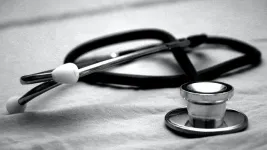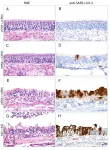(Press-News.org) The Kimberly and Eric J. Waldman Department of Dermatology at the Icahn School of Medicine at Mount Sinai will expand its research training program in skin biology with support from a five-year, $1.3 million T32 grant from the National Institutes of Health (NIH) and the National Institute of Arthritis and Musculoskeletal and Skin Diseases (NIAMS).
The research training program in Systems Skin Biology will take a multidisciplinary approach in teaching scientists to holistically understand human physiology, health, and disease. As a recognized leader in research for skin biology and skin diseases, Mount Sinai will also become an incubator for future biomedical leaders in the field as a result of this program.
Traditional skin biology often focuses on the most obvious cells of the skin, keratinocytes, which form the structure of the epidermis and are essential for skin repair. The Systems Skin Biology program will take an interconnected approach based on the premise that neurons, immune cells, and blood vessels are just as much “skin biology” as traditional skin cells. Mount Sinai researchers have previously discovered new treatments for itch by studying the intersection of nerves and immune cells, and believe future studies through the Systems Skin Biology program will uncover understandings about wound repair, cancer, hair loss, vitiligo, and acne.
“Science and medicine are rapidly evolving, and thus, the training itself must adapt,” said co-Principal Investigator Brian S. Kim, MD, MTR, FAAD, Vice Chair of Research and Director of the Mark Lebwohl Center for Neuroinflammation and Sensation at Icahn Mount Sinai. “This T32 program is truly unique in that it moves away from focusing on only one discipline, but embraces interdisciplinary training across two traditionally disparate fields—such as neuroscience and immunology—by using the skin and associated diseases as a model paradigm.”
Dr. Kim, a renowned physician-researcher in chronic itch and inflammatory skin conditions, said the grant (number 1T32AR082315-01) will initially fund two predoctoral fellows or physician-scientists and two postdoctoral fellows or physician-scientists. It will facilitate the training of students toward PhD and/or MD/PhD degrees in intersectional skin biology, as well as training scientists and clinicians with advanced degrees to become independently funded principal investigators. In addition to dermatology, the research training program in Systems Skin Biology will include expertise drawn from across the Health System, including skin biology, immunology, neuroscience, epithelial biology, translational medicine, and stem cell biology.
“This training grant will be particularly helpful for pre- and postdoctoral fellows and dermatology residents interested in bringing a new angle and new approaches to skin research,” said co-Principal Investigator Sarah E. Millar, PhD, Director of the Black Family Stem Cell Institute and Senior Associate Dean for Basic Research at Icahn Mount Sinai. “After training in diverse labs across Mount Sinai’s campus, they will be able to apply those new skills to uncover novel mechanisms in skin biology and diseases.”
“This T32 program is one of many steps toward our Department becoming the epicenter of innovation and a world leader in dermatology, as well as in training the future leaders and key opinion thought leaders in dermatology,” said Emma Guttman-Yassky, MD, PhD, Waldman Professor of Dermatology and Immunology at Icahn Mount Sinai and Chair of Dermatology at the Mount Sinai Health System. “In addition to bringing recognition of the breadth of institutional excellence in cutaneous diseases and skin biology at Mount Sinai, this training program will have an indelible impact on the future of dermatology and dermatology research for decades to come.”
Mount Sinai continues to be a leader in the field of skin biology throughout New York City and the tri-state region. In 2021, the Health System established a Skin Biology and Diseases Resource-based Center—then one of only six nationwide supported by a NIAMS grant. The Center uses technical innovations, high-end infrastructure, and computing power available at Mount Sinai to advance and support skin research; it also embeds experts in gene editing, genomics, and bioinformatics within skin research labs to break down interdisciplinary communication barriers.
About the Icahn School of Medicine at Mount Sinai
The Icahn School of Medicine at Mount Sinai is internationally renowned for its outstanding research, educational, and clinical care programs. It is the sole academic partner for the eight member hospitals* of the Mount Sinai Health System, one of the largest academic health systems in the United States, providing care to a large and diverse patient population.
Ranked No. 14 nationwide in National Institutes of Health funding and in the 99th percentile in research dollars per investigator according to the Association of American Medical Colleges, Icahn Mount Sinai has a talented, productive, and successful faculty. More than 3,000 full-time scientists, educators, and clinicians work within and across 34 academic departments and 44 multidisciplinary institutes, a structure that facilitates tremendous collaboration and synergy. Our emphasis on translational research and therapeutics is evident in such diverse areas as genomics/big data, virology, neuroscience, cardiology, geriatrics, and gastrointestinal and liver diseases.
Icahn Mount Sinai offers highly competitive MD, PhD, and master’s degree programs, with current enrollment of approximately 1,300 students. It has the largest graduate medical education program in the country, with more than 2,600 clinical residents and fellows training throughout the Health System. In addition, more than 535 postdoctoral research fellows are in training within the Health System.
A culture of innovation and discovery permeates every Icahn Mount Sinai program. Mount Sinai’s technology transfer office, one of the largest in the country, partners with faculty and trainees to pursue optimal commercialization of intellectual property to ensure that Mount Sinai discoveries and innovations translate into health care products and services that benefit the public.
Icahn Mount Sinai’s commitment to breakthrough science and clinical care is enhanced by academic affiliations that supplement and complement the School’s programs. Through Mount Sinai Innovation Partners (MSIP), the Health System facilitates the real-world application and commercialization of medical breakthroughs made at Mount Sinai. Additionally, MSIP develops research partnerships with industry leaders such as Merck & Co., AstraZeneca, Novo Nordisk, and others.
The Icahn School of Medicine at Mount Sinai is located in New York City on the border between the Upper East Side and East Harlem, and classroom teaching takes place on a campus facing Central Park. Icahn Mount Sinai’s location offers many opportunities to interact with and care for diverse communities. Learning extends well beyond the borders of our physical campus, to the eight hospitals of the Mount Sinai Health System, our academic affiliates, and globally.
-------------------------------------------------------
* Mount Sinai Health System member hospitals: The Mount Sinai Hospital; Mount Sinai Beth Israel; Mount Sinai Brooklyn; Mount Sinai Morningside; Mount Sinai Queens; Mount Sinai South Nassau; Mount Sinai West; and New York Eye and Ear Infirmary of Mount Sinai.
END
Mount Sinai awarded prestigious $1.3 million grant to expand research training program in skin biology
2023-04-03
ELSE PRESS RELEASES FROM THIS DATE:
MU grant will help ease nursing workforce shortage
2023-04-03
COLUMBIA, Mo. -- A recent grant from the Missouri Department of Economic Development will help train hundreds of MU students to become part-time nurse assistants at MU Health Care.
The three-year grant, which starts in fall 2023, will create a three-credit hour elective course within the MU Sinclair School of Nursing. The class will help nearly 100 MU students each year earn paid, part-time positions within MU Health Care as nurse assistants, also known as unlicensed assistive personnel (UAPs), certified nurse assistants (CNAs) and patient care technicians.
“We currently have nearly 800 pre-nursing undergraduate students at MU, and as a professor teaching a freshmen-level course, I ...
Yale-led team creates comprehensive resource for impact of genomic variants
2023-04-03
New Haven, Conn. — Each person has about 4 million sequence differences in their genome relative to the reference human genome. These differences are known as variants. A central goal in precision medicine is understanding which of these variants contribute to disease in a particular patient. Therefore, much of the human genome annotation effort is devoted to developing resources to help interpret the relative contribution of human variants to different observable phenotypes – i.e., determining variant impact.
Recently, Yale School of Medicine led a large NIH-sponsored study where multiple institutions and international collaborators came together ...
Illegal trade and poor regulation threaten pangolins in China
2023-04-03
Pangolins, unique scale-covered mammals, are drastically declining in numbers across Asia and Africa, largely due to illegal trade. Part of the trade, both legal and illegal, supports the traditional Chinese medicine market, which has attracted conservation attention. The level of demand for pangolins and other animals in traditional Chinese medicine, however, hasn’t been thoroughly studied.
In a new study published in the journal Nature Conservation, Dr Yifu Wang, currently a postdoc researcher at the University ...
DELLA proteins could hold key to the next Green Revolution
2023-04-03
A family of ‘promiscuous’ proteins found in all land plants is responsible for many different plant functions, despite remaining relatively unchanged for over 450 million years.
New findings, published in Nature Plants and New Phytologist reveal new knowledge about how DELLA proteins regulate how much a plant grows, when germination occurs and how plants deals with threats such as drought and disease. The key is not in DELLA proteins’ ability to mutate over time, but instead in their ability to interact with dozens of different transcription factors, the proteins responsible for decoding DNA.
Understanding the mechanisms which underpin ...
Rising temperatures alter ‘missing link’ of microbial processes, putting northern peatlands at risk
2023-04-03
If you’re an avid gardener, you may have considered peat moss — decomposed Sphagnum moss that helps retain moisture in soil — to enhance your home soil mixture. And while the potting medium can help plants thrive, it’s also a key component of peatlands: wetlands characterized by a thick layer of water-saturated, carbon-rich peat beneath living Sphagnum moss, trees, and other plant life.
These ecosystems cover just 3% of Earth’s land area, but “peatlands store over one-third of all soil carbon on the planet,” explains Joel Kostka, professor and associate chair of Research in the School of Biological ...
Maclean studying paid sick leave mandates & mental health care service use
2023-04-03
Catherine Maclean, Associate Professor, Schar School of Policy and Government, received $641,155 from the National Institutes of Health for: "Paid Sick Leave Mandates and Mental Healthcare Service Use."
This project will provide the first causal estimates of the effect of state and local paid sick leave (PSL) mandates on access to PSL among those with mental health disorder(s), use of mental health care, and indicators of potential quality of mental health care received. It will also examine how community-level factors (e.g., mental health ...
How two different types of immune cells help two billion people keep tuberculosis in check
2023-04-03
More than 10 million people are sickened by tuberculosis (TB) globally each year, resulting in 1.5 million deaths. Yet, as many as two billion people are infected with Mycobaterium tuberculosis, the bacterium that causes tuberculosis, and are otherwise healthy and asymptomatic. Scientists who study TB look at those individuals who can tolerate and contain the infection in hopes of developing better treatments and vaccines.
The key feature of tuberculosis infection in humans is the formation of granulomas, or clusters of immune cells in the lungs that contain the infection. These granulomas contain B cells, all-purpose immune cells that perform a variety of functions, from producing ...
Do Earth-like exoplanets have magnetic fields? Far-off radio signal is promising sign
2023-04-03
Earth's magnetic field does more than keep everyone's compass needles pointed in the same direction. It also helps preserve Earth’s sliver of life-sustaining atmosphere by deflecting high energy particles and plasma regularly blasted out of the sun. Researchers have now identified a prospective Earth-sized planet in another solar system as a prime candidate for also having a magnetic field — YZ Ceti b, a rocky planet orbiting a star about 12 light-years away from Earth.
Researchers Sebastian Pineda and Jackie Villadsen observed a repeating radio signal emanating from the star YZ Ceti using the Karl G. Jansky Very Large Array, a radio telescope ...
Higher lithium levels in drinking water may raise autism risk
2023-04-03
Pregnant women whose household tap water had higher levels of lithium had a moderately higher risk of their offspring being diagnosed with autism spectrum disorder, according to a new study led by a UCLA Health researcher.
The study, published April 3 in JAMA Pediatrics, is believed to be the first to identify naturally occurring lithium in drinking water as a possible environmental risk factor for autism.
“Any drinking water contaminants that may affect the developing human brain deserve intense scrutiny,” said lead study author Beate Ritz, MD, PhD, professor of neurology in the David Geffen School of Medicine at UCLA ...
Nasal vaccine to prevent COVID-19 passes first tests
2023-04-03
Since the beginning of the COVID-19 pandemic, researchers have been working on mucosal vaccines that can be administered through the nose. Now, scientists in Berlin have developed a live attenuated vaccine for the nose. In “Nature Microbiology”, they describe the special immune protection it induces.
Joint press release by Freie Universität Berlin, Max Delbrück Center and Charité – Universitätsmedizin Berlin
Coronaviruses spread primarily through the air. When infected people speak, cough, sneeze or laugh, they expel droplets of saliva containing the virus. Other people then breathe ...




